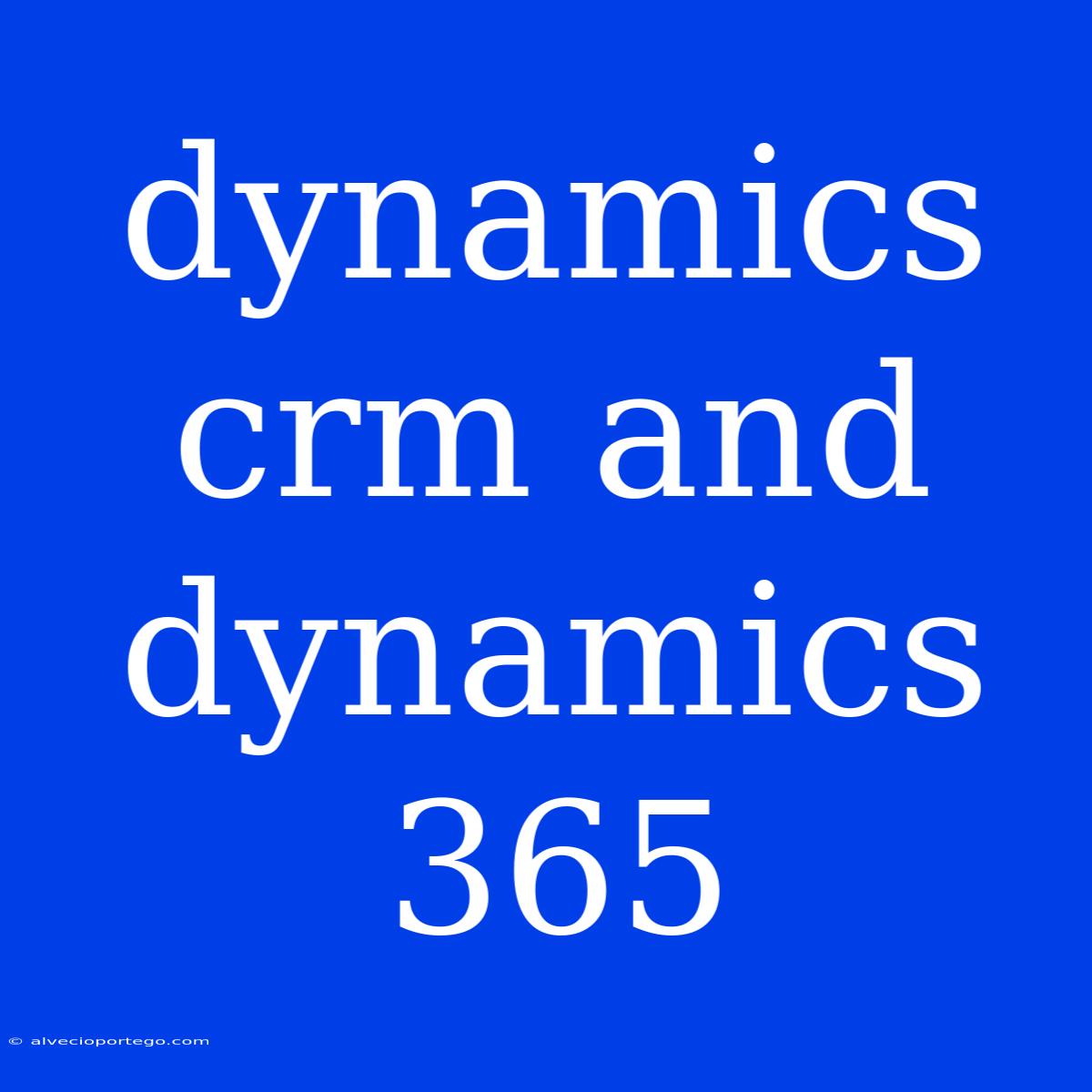Dynamics CRM vs. Dynamics 365: Unveiling the Power of Microsoft's Business Solutions
How do Dynamics CRM and Dynamics 365 differ? Dynamics 365 is the evolved, comprehensive suite, encompassing Dynamics CRM as a core component. This means Dynamics 365 builds upon the CRM foundation, offering a wider range of business applications.
Why is this a critical topic to understand? Navigating the Microsoft Dynamics landscape can be confusing. Knowing the distinction between CRM and 365 empowers businesses to choose the solution that perfectly aligns with their needs.
This guide dissects the intricacies of Dynamics CRM and Dynamics 365, providing a clear roadmap for understanding their capabilities and determining which solution is right for your organization. We will explore their core functionalities, key differences, and how each platform can revolutionize your business operations.
Dynamics CRM: The Foundation for Customer Relationship Management
Dynamics CRM, now known as Dynamics 365 Sales, is a customer relationship management (CRM) solution designed to streamline sales processes, nurture customer relationships, and improve business efficiency.
Key aspects of Dynamics CRM:
- Sales Automation: Automates tasks like lead generation, opportunity management, and sales forecasting.
- Marketing Automation: Provides tools for creating targeted campaigns, managing customer interactions, and analyzing campaign performance.
- Customer Service: Enables efficient customer support through case management, knowledge base access, and communication tools.
Dynamics 365: A Comprehensive Business Suite
Dynamics 365 goes beyond CRM, offering a holistic suite of applications for various business functions.
Key aspects of Dynamics 365:
- CRM foundation: Dynamics 365 incorporates Dynamics CRM (Sales) as a core component, providing a robust foundation for managing customer relationships.
- Extended Functionality: Dynamics 365 expands beyond CRM to include solutions for Finance, Marketing, Operations, and more.
- Integration: Offers seamless integration between different applications, allowing for a unified business view.
Dynamics CRM vs. Dynamics 365: A Detailed Comparison
| Feature | Dynamics CRM (Sales) | Dynamics 365 |
|---|---|---|
| Focus | Customer Relationship Management | Comprehensive Business Solutions |
| Applications | Sales, Marketing, Customer Service | Sales, Marketing, Customer Service, Finance, Operations, HR, and more |
| Target Audience | Businesses focused on sales and customer interactions | Businesses seeking a holistic solution across multiple departments |
| Scalability | Scalable for small to medium businesses | Highly scalable for businesses of all sizes |
| Integration | Integrates with other Microsoft products | Offers extensive integration capabilities with various platforms |
Dynamics CRM: Tailoring to Specific Customer Needs
Dynamics CRM (Sales) remains a powerful solution for businesses primarily focused on customer relationship management. Its intuitive interface, robust functionality, and affordable pricing make it an ideal choice for small to medium-sized businesses aiming to improve their sales and customer service operations.
Key aspects of Dynamics CRM (Sales):
- Lead Management: Capture and qualify leads, track their progress through the sales funnel, and manage lead distribution.
- Opportunity Management: Manage sales opportunities, track key metrics, forecast revenue, and optimize sales processes.
- Customer Service Management: Handle customer inquiries and issues, track resolution progress, and improve customer satisfaction.
Dynamics 365: Expanding Business Horizons
Dynamics 365 offers a comprehensive solution for businesses looking to optimize various aspects of their operations. Its wide range of applications, advanced integration capabilities, and robust analytics empower organizations to achieve greater efficiency, streamline processes, and make data-driven decisions.
Key aspects of Dynamics 365:
- Financial Management: Manage finances, track financial performance, and automate accounting tasks.
- Operations Management: Optimize supply chain, manage inventory, and improve production efficiency.
- Human Resources: Streamline HR processes, manage employee data, and improve employee engagement.
Choosing the Right Solution: Dynamics CRM or Dynamics 365
The choice between Dynamics CRM (Sales) and Dynamics 365 depends on your specific business needs and goals.
If your primary focus is on customer relationship management, Dynamics CRM (Sales) offers a robust and cost-effective solution.
If you require a holistic business solution spanning multiple departments, Dynamics 365 provides a comprehensive suite of applications to enhance your overall business performance.
This guide provides a foundational understanding of Dynamics CRM and Dynamics 365. Further research and consultation with Microsoft experts can help you determine the optimal solution for your unique needs and unlock the power of these transformative business platforms.

